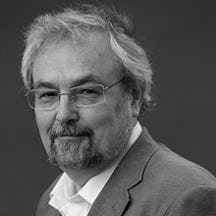HomePart 19 of Joy and Tranquillity digital guide
Robin Dunbar talks about social connection and wellbeing
Listen to the audio
Watch the BSL video
About the speaker
Robin Dunbar
Robin Dunbar is Emeritus Professor of Evolutionary Psychology at the University of Oxford, with expertise in the evolution of sociality in primates and other mammals. He formulated the famous ‘Dunbar’s number’, indicating the number of individuals with whom any one person can maintain stable relationships. His academic and research career includes the universities of Bristol, Cambridge, Liverpool and University College London. He has written extensively, including the books ‘Friends: Understanding the Power of Our Most Important Relationships’ (2021), ‘Human Evolution’ (2014), ‘How Many Friends Does One Person Need?: Dunbar’s Number and Other Evolutionary Quirks’ (2010) and ‘Grooming, Gossip and the Evolution of Language’ (1996). His awards include the Huxley Memorial Medal (2015), the highest honour of the Royal Anthropological Institute of Great Britain and Ireland.
